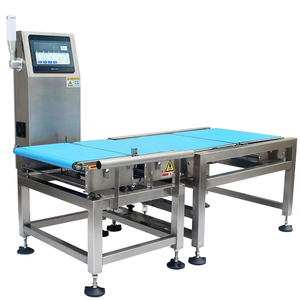
All categories
Featured selections
Trade Assurance
Buyer Central
Help Center
Get the app
Become a supplier

(941 products available)












































Pharmaceutical checkweighers perform critical quality control in the pharmaceutical sector, ensuring that products meet the required weight specifications. As a result, they come in diverse configurations to meet pharmaceutical companies' unique needs and product types.
As the name suggests, manual checkweighers are operated by the personnel weighing the items. Such kinds are usually found in smaller drug manufacturing companies or those who are just starting out. They provide the flexibility of weighing small batches. The limited speed and need for more detail make them suitable for low-volume operations.
Many large pharmaceuticals prefer automatic checkweighers because it easily handles bulk production. They are fast and efficiently weigh items without human involvement. That makes them indispensable for large-run production processes.
A static checkweigher weighs items when they are stationary. In pharmaceutical settings, these are used to check the weight of individual packets, bottles, or capsules. Pharmacies utilize this to ensure that each unit meets the right weight standards.
On the other hand, dynamic checkweighers measure the weight of items while in motion. These checkweighers become prevalent in automated production lines where packages are moving fast. They provide real-time quality control.
Multihead checkweighers are equipped with several hoppers and weigh cycles. They are typically used for weighing multiple pharmaceutical products. This type of checkweigher is ideal for counting tablets, capsules, or packets of medicine.
Pharmaceutical checkweigher features impact precision, efficiency, and regulatory compliance in weight verification.
Checkweighers primarily use load cells to gauge weight. Checkweighers in the pharmaceutical sector should have high-precision load cells. For mass-produced pharmaceutical products, even minor weight variations can impact dosage quality.
Speed becomes a major concern when working with massive production lines. Checkweighers should quickly process large volumes of packages without lagging. Automated checkweighers are capable of this task. They can check hundreds or thousands of items every minute.
Modern Checkweighers have data management capabilities. Data on average weights, deviations, and any identified faults can be recorded and stored. This data is crucial for generating compliance reports and for future reference.
Pharmaceutical products frequently differ in prescribed weights. However, some have a small tolerance margin. This tolerance is adjustable on advanced checkweighers. They can instantly change weight appraisal thresholds based on product requirements.
Pharmaceutical checkweighers become an integral part of various commercial applications across the industry.
By ensuring correct weights, checkweighers help prevent under or over-dosing of drugs in these products. This reduces wastage and maintains adherence to quality benchmarks.
In the packaging of liquid medicines, such as syrups or injections, precise weight is vital to ensure proper dosage. Checkweighers catch any discrepancies in the fill levels during this process.
After products are packed, pharmaceutical packaging checkweigher verifies the weight of each package before dispatch. This ensures the accuracy of shipments, reducing errors, and enhancing operational efficiency.
Regulatory agencies like the FDA have stringent rules on weight and dosage in the pharmaceutical sector. Thus, Checkweighers assist businesses in complying with these rules. They facilitate real-time weight checks for consistent quality control across the board.
Pharmaceutical checkweighers are also useful for inventory management. They quickly measure the weights of raw materials or chemicals. This precision helps maintain optimal stock levels while managing resource utilization effectively.
Selecting the right pharmaceutical checkweigher depends on several factors, including the specific requirements of the production environment and the types of products being weighed.
High accuracy and precision should be the primary consideration when dealing with the pharmaceutical realm. Look for checkweighers with minimal tolerances and high-resolution displays. They generally ensure strict adherence to dosage requirements.
How fast can it weigh? How massive is the product load it can possibly handle? The answers to these questions are key when selecting weighers in high-production settings. Choose checkweighers that provide high-speed processing with large weighing capacities.
Checkweighers in the pharmaceutical industry have to comply with the current Good Manufacturing Practices (cGMP) and FDA regulations. Buyers must confirm that the choice meets all necessary regulatory requirements.
In most cases, buyer's weighing machines will have to work with existing production and packaging systems. Thus, always consider how well the checkweigher will mesh with hardware and software in use. It should seamlessly integrate with automated production lines and data management systems.
Pharmaceutical checkweighers have to be operational under challenging environments. Therefore, select weighers made with robust, durable materials that can withstand continuous operation for long. Moreover, Verify IP ratings to ensure the checkweigher has proper protection against dust and moisture. This is vital for maintaining long-term reliability.
Pharmaceutical checkweighers are important quality assurance tools. They ensure that the weights of drugs correspond to the set industry standards. As a result, they help avoid underdosing or overdosing and are vital in ensuring dosage precision.
Though many factors contribute to precision, high-precision load cells are a primary cause. These load cells are responsible for weight measurement. They help in maintaining the required level of dosage consistency.
Indeed, there are various types of checkweighers tailored specifically for products ranging from solid tablets and capsules to viscous liquids. The choice of checkweigher depends on the characteristics of the product and the production process.
Simply put, yes. Moreover, manufacturers frequently advise regular calibration as well as cleaning to maintain accuracy. This is especially necessary in drug production, where cleanliness and precision are critical. Thus, routine maintenance helps in sustaining performance and compliance.